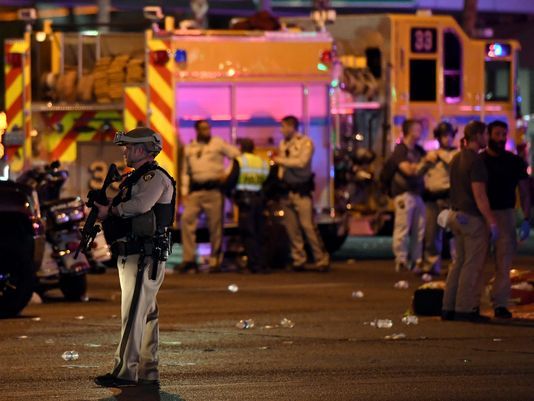When Darkness Seems to Hide His Face

Our nation has woken up to yet another mass shooting.
With every click of the “refresh” button, the news updates reveal more carnage, more sorrow out of Las Vegas: 20 dead. Now 50. 100 injured. Now more than 200. As the minutes of this day tick by, the death and injury toll will likely go nowhere but up.
And even with the macabre familiarity we have to violent, senseless acts in our time, it seems that we have conditioned ourselves to respond in numb, rote fashion. We will mourn via headline consumption, we will grieve by way of hashtags, we will call for justice and reform in every corner of the internet, and yet we will instinctively know that none of our cries for justice will be answered before another news story eclipses the horror of this one.
While we may be conditioned to the response, we aren’t quite acclimated to the issue. Theologians call it the problem of evil: how do you reconcile the horrific crimes and pains of the world with an all-loving God? How can any of us trust a God – does that God exist? – who allows innocents to die – are any of us truly innocent? How can someone be so deranged, so evil, that they would check into a hotel, load their weaponry on a luggage cart the way we would load a camera bag or a cooler, open a window to survey a crowd below, and start shooting?
The only answer is sin. The only remedy is the cross. The only hope is Jesus.
As the people of God process this day, we must take the time to call evil evil. We must point people to Jesus. And we must give people – people in our workplaces, people in our schools, people in our neighborhoods – space to ask hard questions and be satisfied that we will not know all the answers.
I dare not presume to explain the problem of evil, because I’ve asked those questions myself. I’ve asked those questions today. But my finite understanding does not negate an omniscient God. My inability to see the larger picture does not mean a picture isn’t being painted. My failure to see good does not invalidate Romans 8:28.
This world is dark and our days are grim. They will get darker and they will get grimmer. It has been that way since our first parents chose their own desires and became rebels against the kingdom. Our sin was the reason that Jesus came. Our rebellion was the catalyst that caused him to die, and his cross was the meeting place between God’s wrath and our depravity.
But it was his blood that covered that depravity. His blood removed our sin. His blood provided the great exchange between our life and his.
It’s only at the cross that we find hope for our souls. And it’s only the empty tomb where we can find hope out of death and tragedy.
Don’t squander the opportunity you will have to make much of the cross and the empty tomb on this day. Don’t fall into the entrapping cycle of empty arguments and ultimately hollow hashtags. Listen. Grieve. Process.
Point people to Jesus, for it’s only in him that we will find hope.
A portion of this post was originally included in “The Cross in the Midst of Chaos“.
